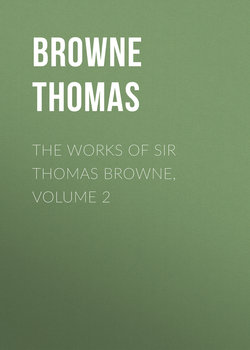Читать книгу The Works of Sir Thomas Browne, Volume 2 - Browne Thomas - Страница 15
THE THIRD BOOK —continued
CHAPTER XXIV
That all Animals of the Land, are in theirkind in the Sea
ОглавлениеThat all Animals of the Land, are in their kind in the Sea, although received as a principle, is a tenent very questionable, and will admit of restraint. For some in the Sea are not to be matcht by any enquiry at Land, and hold those shapes which terrestrious forms approach not; as may be observed in the Moon-fish, or Orthragoriscus, the several sorts of Raia’s, Torpedo’s, Oysters, and many more, and some there are in the Land which were never maintained to be in the Sea, as Panthers, Hyæna’s, Camels, Sheep, Molls, and others, which carry no name in Icthyology History of fishes., nor are to be found in the exact descriptions of Rondoletius, Gesner, or Aldrovandus.
Again, Though many there be which make out their nominations, as the Hedg-hog, Sea-serpents and others; yet are there also very many that bear the name of animals at Land, which hold no resemblance in corporal configuration; in which account we compute Vulpecula, Canis, Rana, Passer, Cuculus, Asellus, Turdus, Lepus, etc. Wherein while some are called the Fox, the Dog, the Sparrow or Frog-fish: and are known by common names with those at Land; yet as their describers attest, they receive not these appellations from a total similitude in figure, but any concurrence in common accidents, in colour, condition or single conformation. As for Sea-horses which much confirm this assertion; in their common descriptions, they are but Crotesco deliniations which fill up empty spaces in Maps, and meer pictorial inventions, not any Physical shapes: sutable unto those which (as Pliny delivereth) Praxiteles long ago set out in the Temple of Domitius. For that which is commonly called a Sea-horse, is properly called a Morse, and makes not out that shape. That which the Ancients named Hippocampus is a little animal about six inches long, and not preferred beyond the classis of Insects. That which they termed Hippopotamus an amphibious animal, about the River Nile, so little resembleth an horse, that as Mathiolus observeth, in all except the feet, it better makes out a swine. That which they termed a Lion, was but a kind of Lobster: that which they called the Bear, was but one kind of Crab: and that which they named Bos marinus, was not as we conceive a fish resembling an Ox, but a Skait or Thornback, so named from its bigness, expressed by the Greek word Bous, which is a prefix of augmentation to many words in that language.
And therefore although it be not denied that some in the water do carry a justifiable resemblance to some at Land, yet are the major part which bear their names unlike; nor do they otherwise resemble the creatures on earth, then they on earth the constellations which pass under animal names in heaven: nor the Dog fish at Sea much more make out the Dog of the Land, then that his cognominal or name-sake in the heavens. Now if from a similitude in some, it be reasonable to infer a correspondence in all, we may draw this analogy of animals upon plants; for vegetables there are which carry a near and allowable similitude unto animals. Fab. column. de stirp. rarioribus, Orchis, Cercopithecophora, Anthropophora. We might also conclude that animal shapes were generally made out in minerals: for several stones there are that bear their names in relation to animals or their parts, as Lapis anguinus, Conchites, Echinites, Encephalites, Ægopthalmus, and many more; as will appear in the Writers of Minerals, and especially in Bœtius and Aldrovandus.
Moreover if we concede, that the animals of one Element, might bear the names of those in the other, yet in strict reason the watery productions should have the prenomination: and they of the land rather derive their names, then nominate those of the Sea. For the watery plantations were first existent, and as they enjoyed a priority in form, had also in nature precedent denominations: but falling not under that Nomenclature of Adam, which unto terrestrious animals assigned a name appropriate unto their natures: from succeeding spectators they received arbitrary appellations: and were respectively denominated unto creatures known at Land; who in themselves had independent names and not to be called after them, which were created before them.
Lastly, By this assertion we restrain the hand of God, and abridge the variety of the creation; making the creatures of one Element, but an acting over those of another, and conjoyning as it were the species of things which stood at distance in the intellect of God; and though united in the Chaos, had several seeds of their creation. For although in that indistinguisht mass, all things seemed one; yet separated by the voice of God, according to their species, they came out in incommunicated varieties, and irrelative seminalities, as well as divided places; and so although we say the world was made in six days, yet was there as it were a world in every one; that is, a distinct creation of distinguisht creatures; a distinction in time of creatures divided in nature, and a several approbation and survey in every one.
